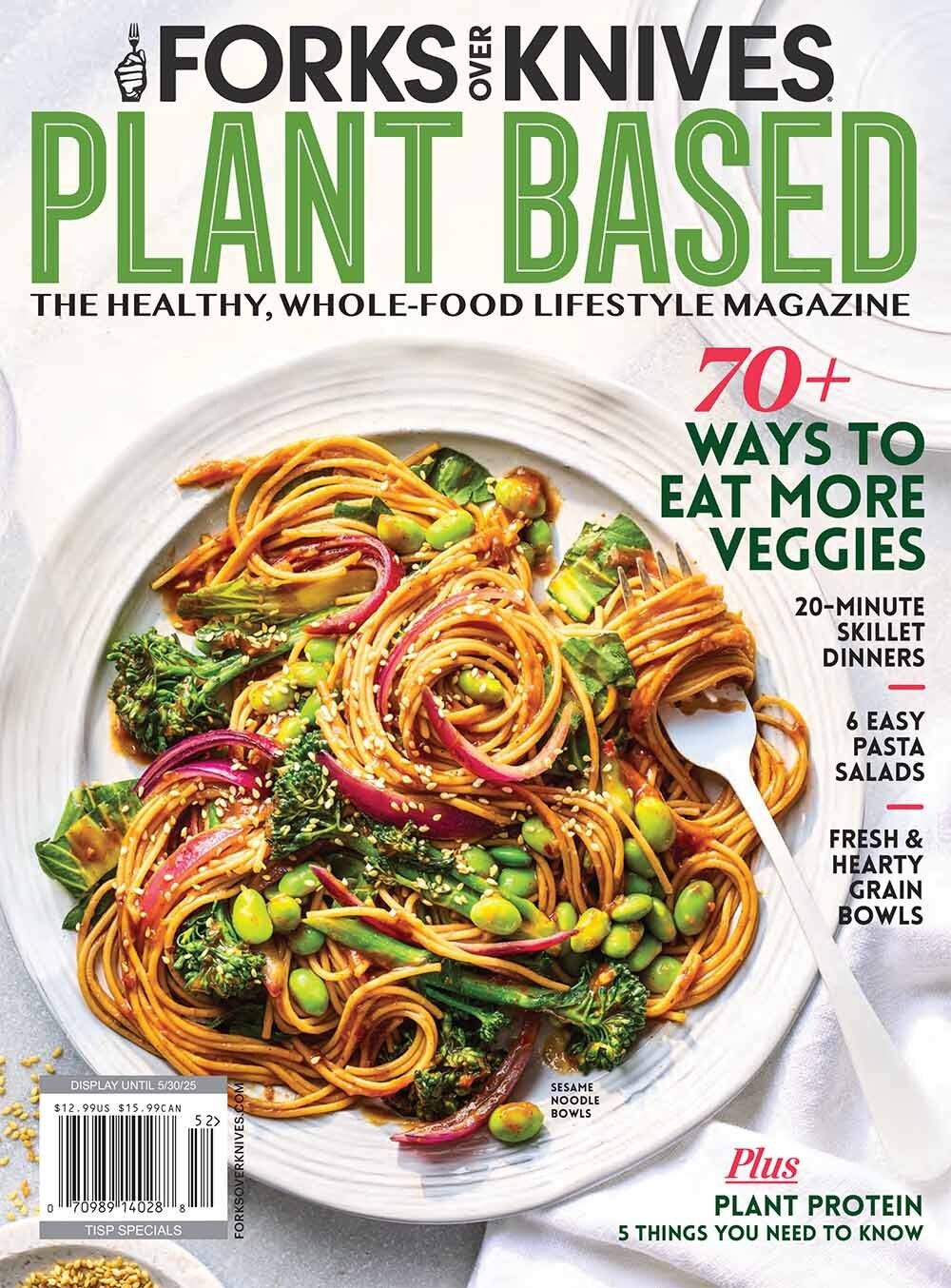
New Studies Show Eating Plant-Based at Any Age Can Protect Against Heart Disease Later In Life
Two large-scale observational studies published last week in the Journal of the American Heart Association came to the same conclusion: the more plants and minimally processed food in a person’s diet, the less likely they are to suffer from heart attack, stroke, or heart failure.
Let’s take a closer look at the research.



The Spring 2025 magazine is here!
Our gorgeous “bookazine” features over 80 fresh and tasty recipes.
Eating Plant-Based as a Young Adult Decreases Risk of Heart Disease in Middle Age
In the first study, researchers followed nearly 5,000 people for several decades. All participants were young adults (between 18 and 30 years old) when the study began. Over the next 32 years, doctors evaluated the participants’ health, asked about the foods they ate, and gave them a dietary quality score—but they did not tell participants what to eat. Foods such as fruits, vegetables, beans, nuts, and whole grains were considered beneficial, while those such as fried potatoes, high-fat red meat, salty snacks, pastries, and soft drinks were considered adverse. Neutral foods included refined grains, lean meats, and shellfish.
None of the participants had cardiovascular disease (CVD) at the outset of the study, but by the end of the study, almost 300 people had developed CVD. Researchers discovered that participants who ate a plant-centered diet were 52 percent less likely to have a heart attack or other CVD-related incident during middle age.
And the participants whose diets improved the most as they got older—meaning they ate more plant-based as the years went by—were 61 percent less likely to develop CVD compared with those whose diets worsened the most over time.
“People can choose among plant foods that are as close to natural as possible, not highly processed,” said the study’s lead author, Yuni Choi, a postdoctoral researcher in the division of epidemiology and community health at the University of Minnesota School of Public Health in Minneapolis. She also noted that while the goal is to eat more plants than animal products, strict veganism isn’t necessary to reap some of the heart-health benefits of eating more whole plant foods.
Plant-Based Eating Reduces Risk of Heart Disease In Postmenopausal Women
A 15-year study that followed 123,330 women between the ages of 50 and 79 discovered several significant links between plant-based diets and heart health. Researchers scored the study participants on their adherence to the plant-based “Portfolio Diet,” which focuses on consuming foods that are known to lower “bad” LDL cholesterol, including legumes, starchy vegetables, soy foods, and berries. Participants who closely followed the Portfolio Diet were:
- 11 percent less likely to develop cardiovascular disease of any kind
- 14 percent less likely to develop coronary heart disease, in which plaque builds up in the walls of the arteries leading to the heart
- 17 percent less likely to develop heart failure, which occurs when the heart can’t pump blood as well as it should
“We also found a dose response in our study, meaning that you can start small, adding one component of the Portfolio Diet at a time, and gain more heart-health benefits as you add more components,” said lead author Andrea J. Glenn, a registered dietitian and doctoral student in nutritional sciences at the University of Toronto.
The study’s senior author, John Sievenpiper, MD, PhD, postulated that greater adherence to the Portfolio Diet could be as effective as cholesterol-lowering medication.
It’s Never Too Late to Go Plant-Based
These two latest studies add to the growing body of evidence that a plant-based diet can drastically decrease the risk of developing cardiovascular disease at any age or stage of life.
Heart disease is the leading cause of death in the world, killing more people than all forms of cancer combined. These latest scientific findings are particularly impactful for people living in the United States, where CVD takes one life every 37 seconds.
To learn more about a whole-food, plant-based diet, visit our Plant-Based Primer. For meal-planning support, check out Forks Meal Planner, FOK’s easy weekly meal-planning tool to keep you on a healthy plant-based path.
About the Author

About the Author
Megan Edwards
Join our mailing list
Get free recipes and the latest info on living a happy, healthy plant-based lifestyle.
By providing your email address, you consent to receive newsletter emails from Forks Over Knives. We value your privacy and will keep your email address safe. You may unsubscribe from our emails at any time.
